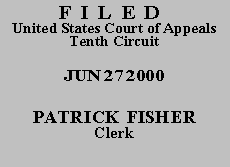

| ALFONZO SMITH,
Petitioner-Appellant, |
|
| v. | |
| RON CHAMPION,
Respondent-Appellee. |
|
Alfonzo Smith appeals the district court's denial of his 28 U.S.C. § 2254 petition for habeas corpus relief. We exercise jurisdiction pursuant to 28 U.S.C.
§ 1291, deny Smith a certificate of appealability, deny his motion to proceed on appeal in forma pauperis, and dismiss his appeal.
Smith pled guilty to and was convicted of unlawful distribution of cocaine, in violation of Okla. Stat. tit. 63, § 2-401, and was sentenced to 15 years in prison. The trial court denied Smith's motion to withdraw his guilty plea in which he claimed he did not understand his constitutional rights at the plea hearing. Smith appealed to the Oklahoma Court of Criminal Appeals, arguing the trial court abused its discretion in denying his motion to withdraw his plea and that he received ineffective assistance of counsel. The Oklahoma Court of Criminal Appeals summarily affirmed Smith's conviction and sentence.
In April 1998, Smith filed a 28 U.S.C. § 2254 petition for habeas relief in federal district court. The magistrate judge recommended denial of Smith's § 2254 petition, and Smith filed objections to the magistrate's report. The district court adopted the magistrate's recommendation and denied Smith's § 2254 petition. The district court also denied Smith a certificate of appealability and leave to proceed on appeal in forma pauperis.
In reviewing the denial of habeas relief, we review the district court's factual findings under a clearly erroneous standard and its legal conclusions de novo. Rogers v. Gibson, 173 F.3d 1278, 1282 (10th Cir. 1999), cert. denied, 120 S. Ct. 944 (2000). Section 2254(d) provides that a petitioner in the custody of a state court shall not be granted habeas relief
with respect to any claim that was adjudicated on the merits in State court proceedings unless the adjudication of the claim(1) resulted in a decision that was contrary to, or involved an unreasonable application of, clearly established Federal law, as determined by the Supreme Court of the United States; or (2) resulted in a decision that was based on an unreasonable determination of the facts in light of the evidence presented in the State court proceeding.
See Williams v. Taylor, 120 S. Ct. 1495, 1506-08 (2000) (clarifying § 2254(d) standard of review).
On appeal, Smith alleges the trial court abused its discretion in denying his request to withdraw his plea and he was denied effective assistance of counsel. Smith makes no specific arguments as to how the trial court erred in not allowing him to withdraw his plea or how he received ineffective assistance of counsel, citing only general principles of law. The magistrate determined that Smith's withdrawal argument was procedurally barred because he did not raise the specific issue in his direct appeal and failed to establish the prejudice necessary to overcome that bar. The magistrate further concluded that Smith knowingly and voluntarily entered his plea. The magistrate then concluded that Smith received effective assistance of counsel. After reviewing the record, we are convinced Smith has shown no error warranting federal relief.
We DENY Smith a certificate of appealability, DENY his motion to proceed on appeal in forma pauperis, and DISMISS his appeal. The mandate shall issue forthwith.
Entered for the Court
Mary Beck Briscoe
Circuit Judge
*.This order and judgment is not binding precedent, except under the doctrines of law of the case, res judicata, and collateral estoppel. The court generally disfavors the citation of orders and judgments; nevertheless, an order and judgment may be cited under the terms and conditions of 10th Cir. R. 36.3.